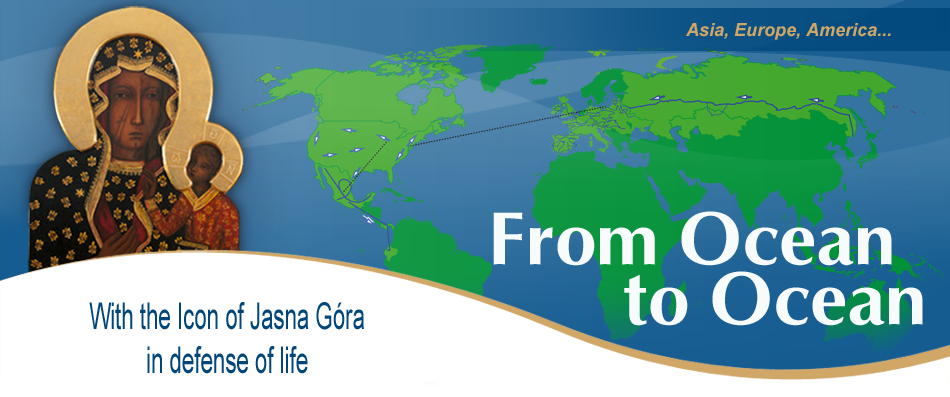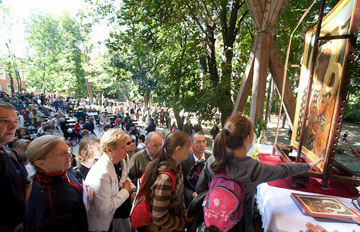Oradea (hun. Nagyvárad) is a city in northern Romania populated with ethnic Hungarians. This area is very significant historically, due to its great defeat of the Christian troops at Mohi under the invasive pressure of the Mongolian army in 1241 A.D. Many people were brutally murdered, yet the victorious Mongolians continued to press further West into Europe.
Here, Father László Fodor, the Vicar of Bishop László Böcskei, met Our Lady and celebrated the Holy Eucharist in Hungarian.
Our Lady returned to Hungary on the 13th of September, where She crossed the River Tisza, visiting the historic city of Szeged. The Vicar General of the Diocese of Szeged-Csanád, Father Lajos Kondé, presided over the Liturgy of the Holy Mass in the Catholic church, called Dóm Templom. After a great flood, the survivors of the city made a vow to build a great church, which was to serve as a token of gratitude offered to God for saving their lives.
During that time, the feretory had to be quickly repaired, as it cracked due to constant overload. Providentially, the Hungarian experts efficiently welded the aluminum and the problem was solved.
There was still enough time for Our Lady to make a stop in Csillag Star, known for its 17th century fortress. After the prayer in front of the gate to the famous prison, the peregrination coordinators left some leaflets with the image of Our Lady for the prisoners.
The next city was Mohács, located on the Danube River. This city is famous for its historic battle at Mohi in 1526 A.D., where the Christian Hungarian resistance collapsed, overrun by the Islamist armies of Suleiman, the commander of the Ottoman Turks. This resulted in about 150 years of Turkish rule and the destruction of churches, convents and cities. Here, the Icon of Our Lady of Czestochowa was being greeted with particular expressions of faith, dignity, and concern. The local pastor, Father Attila Attila Porpáczy was presiding over the Sacrifice of the Holy Mass here.
Pécs was the following city, which Our Lady in the Czestochowa Icon had visited. This city is called "Fivechurches," after the five ancient Christian churches built in the times of the Roman Empire, the ruins of which can still be seen today. In the second century, the Romans founded the city Sopianae here, and named the region Panonia. Bishop Bartholomew, who was the founder of the thirteenth century male religious order, later called the Pauline Fathers, also came from the city Pécs. Our Lady was welcomed by Father Attila Péter Cseh, the pastor of St. Elizabeth of Hungary Church, who also led the faithful in the Rosary prayer.
In Kaposvár on the Kapos River, the capital of the Somogy Region, at the Church of the Holy Cross, Father Kálmán Nyéky celebrated Holy Mass. He is the grandson of the well-known Christian bioethicist, Gyula Gajzler.
On the way to the capital, a visit was made to the Church of Our Lady Queen of Angels in Budakeszi, where the veneration and the Holy Mass was led by the custodian of the shrine, Father Szabolcs Szilagyi. Early in the morning, the students and teachers of the Catholic Bishop Otto Prohaszka Gymnasium (High School) carried the Icon into the school chapel for the celebration of the Liturgy of the Eucharist and veneration.
In Budapest, the capital of Hungary, Our Lady in the Icon of Czestochowa, started out with the visit of the St. Angela Merici Catholic School. The coordinators made an attempt to visit and hand out leaflets at the labor and delivery center of the St. John Nepomucene Hospital. A wonderful welcoming ceremony was prepared by the Franciscans in the old Church of St. Assissi, where a solemn Mass was celebrated, followed by an all-night prayer vigil.
The main Mass in Budapest was celebrated in the historical, 14th century ruins of the first Pauline monastery of St. Lawrence, namely the Hungarian Jasna Gora. The Auxiliary Bishop of the Esztergom-Budapest Diocese, Bishop János Székely presided over the Holy Sacrifice of the Mass, concelebrated by Pauline Father, Barnabás Balla.
On Saturday, September 15th, Our Lady in the Czestochowa Icon participated in the national Hungarian pilgrimage from Budapest to Máriaremete (ca. 7 km) to honor the memory of the Servant of God, Cardinal József Mindszenty, the great Primate of Hungary, who was imprisoned and persecuted by both, the Nazis and the Communists. The current Primate of Hungary, Cardinal Péter Erdő presided over the celebration of the Holy Liturgy of the Eucharist, who personally kissed the Icon of Our Lady of Czestochowa and spoke with great committment about the peregrination "From Ocean to Ocean" across the world in defense of life.
On Sunday, September 16th, the pilgrimage of Our Lady through Hungary had also arrived at Veszprém (110 km from the capital). The Icon of Czestochowa was welcomed in the historic Cathedral of St. Michael by the Archbishop Gyula Márfi, the Ordinary of the Diocese of Veszprém, who presided over the Holy Eucharist. At night, a candle-light procession took place for the intention of reparation and penance for sins against life and for conversion. The procession walked from the cathedral to the city square in front of the local hospital, where abortions take place.
After the visit in Szombathely, Öriszentpéter, Zalaegerszeg, and a small village called Rédics, where the pastor ministers to the youth and snatches their attention when skateboarding, in his cassock of course, the peregrination of the Czestochowa Icon came to an end in Hungary. The Icon traveled 3,025 km through Hungary and Romania combined. During that time, thousands of people have met with Our Lady, praying for the intention of the defense of life.
On Monday, September 17th, the Icon was presented to the Pro-Life Movement in Lendava, Slovenia.










